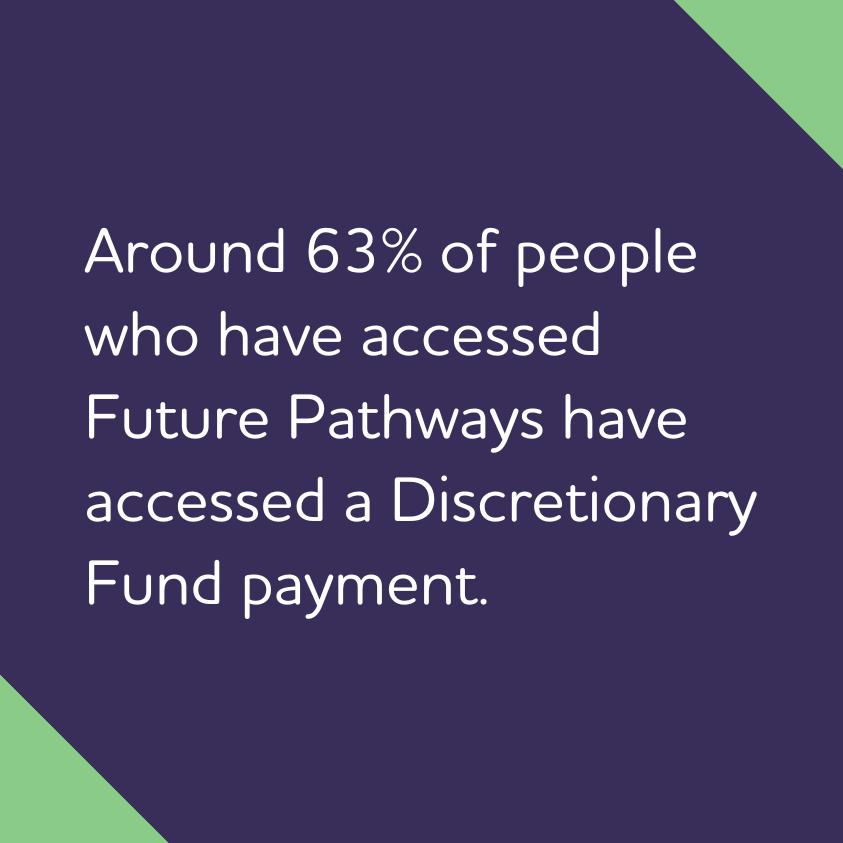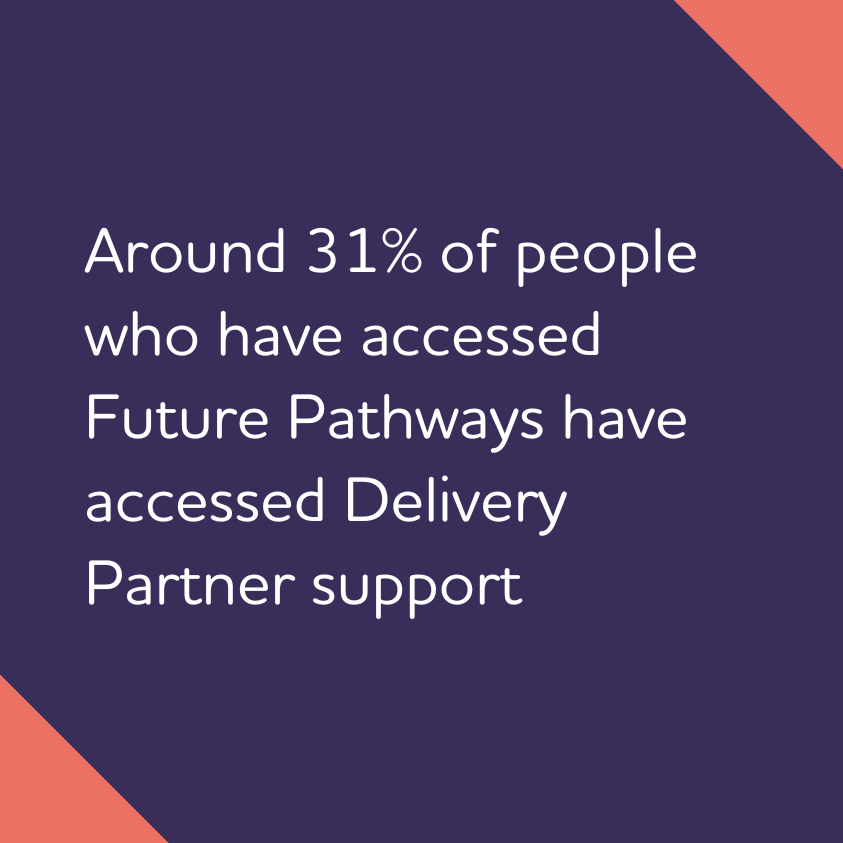Our latest Quarterly Report is now available to view. It covers our work from July to September 2024. It shows what we’ve learnt, and includes key stats and feedback from those who access Future Pathways.
What happened in Q2
48 people registered with Future Pathways.
25 people started working with a Support Coordinator.
At least 97 people were accessing support from at least 35 Delivery Partners.
Who we supported
The average age of people who registered with us was 49.
80% of people who registered with us live in Scotland’s most populated areas.
How people felt
We received positive feedback from people we support, and we also received suggestions for how we could improve.
People shared that they felt Future Pathways understood and cared about them. Many people also shared that they felt able to trust Future Pathways.
7 out of 7 people who answered our feedback forms feel that Future Pathways understands them and their needs.
People also told us that some experiences, like gaps in contact, could negatively affect their trust in the service.
What people gained
People accessed a mix of different types of support in Q2. Many people told us they feel able to access the support that is right for them.
Many people accessed support from our Delivery Partners, such as record search support, creative therapies and support work.
Many people accessed support through our Discretionary Fund such as support to make their home feel safe and comfortable, and to progress outcomes around health and fitness.
People also accessed support to link up with existing services such as housing and healthcare supports.
What changed for people
People shared what changed in their life after accessing support from Future Pathways. Many people fed back that they know more about their strengths and what they can do. They also told us they feel clearer about the changes they want to make with our support.
5 out of 7 people who answered our feedback forms now know what changes they want to make in their life.
What difference we made
Many people shared the impact of their work with Future Pathways.
5 out of 7 people who answered our feedback forms feel more hopeful about their future.
Some people told us they feel their life is better overall since accessing Future Pathways support.
Our full report features further infographics, feedback and a breakdown of our financial spend.

We asked Bill about his book, and why he decided to tell his story.
Future Pathways supported Bill to write a book about his life. He worked with The Book Whisperers to do this. The Book Whisperers are one of our Delivery Partners.
Bill is from the north of Scotland and speaks in the ‘Doric’ dialect that is common there. The book is written in the same dialect. Even if you’re not familiar with Doric, you can still understand the book. It’s called ‘Tellin’ It Like It Is: ma life on and aff the rails’. Bill chose this title because for many years he worked as a train driver.
Bill had often thought about writing a book and when he said this to his Support Coordinator, she told him about The Book Whisperers. Bill says:
“I thought: ‘Why not?’, so Future Pathways put me in touch with Katie at The Book Whisperers, and it just went from there. I told them what I wanted in the book – my own words. It’s my story.”
Bill met with Katie online, over a few months, to tell his story. He has had an interesting life, starting on a farm in Aberdeenshire.
“I’m 72 now, and I’ve lived a good life. I’m a country boy, born and bred. Born on a farm, and all the kids at school were farmers’ kids. When I was 7 years old I’d take the cows in for milking every morning, and milk them myself. The farming then was a lot different to what it is now. Then it would take 6 or 7 men to run a farm. Now one or two can do it.”
So what inspired Bill to write the book?
“The book is my whole life story, from start to finish. I don’t know what people will like about it – that’s up to them. Everything in the book is God’s honest truth. Nothing made up at all. I’ve never done that in my life, and I’m not going to start now. It’s all in there – including the swear words! I don’t just tell people what they want to hear. I tell it like it is.”
Bill now has quite a lot of serious health problems, but this hasn’t changed his approach to life or his sense of humour.
“I go to the hospital every few months to see a specialist. At my last visit, he called me ‘Wonderboy’. I said ‘Why do you call me that?’ He said, ‘Because I wonder why you’re still here!’ I just take every day as it comes.”
Want to know more?
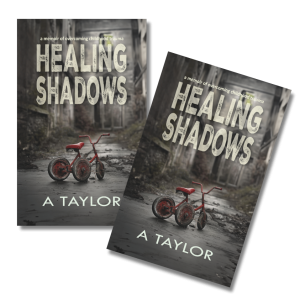
Healing Shadows is a book written by AT, one of the people we support. It is about his experiences growing up in the Scottish care system in the early 60s.
We recently talked to AT about his feelings and how these have impacted his life so far. And we talked to him about his new book.
AT’s journey towards writing his book started in 2018 when he appeared at the Scottish Child Abuse Inquiry to give evidence. He explains:
“I was adamant I wanted to appear at the Inquiry. It was very important for me to do so even though I knew it would be difficult to do so. I wanted to tell my story just like many others. It was very tough and at the end of it, I was given the opportunity to read out a statement I had written. It was very emotional and quite overwhelming which resulted in me breaking down on several occasions. I remember Lady Smith saying to me when I had finished that my “words would not go unheard”. I was very proud of what I had achieved and the KC involved congratulated me and indicated to me it was very powerful.”
The Inquiry had triggered many feelings for AT. AT had built a very good working relationship with his Support Coordinator at Future Pathways. He talked to her about how he had been feeling.
“My Support Coordinator had always been very empathetic and had that natural ability to just listen. As a survivor, sometimes that’s all you need.”
AT continued to be open with his Support Coordinator. He also went to counselling. Over the years, he has managed to get a good insight into his own mental health.
Last year, he told his Support Coordinator that he had always wanted to write a book about his childhood. They both agreed he would make a start and he wrote the first chapter.
His Support Coordinator then put him in touch with The Book Whisperers. They give guidance and support to help people achieve the goal of writing a book.
“I felt there was something unique in putting pen to paper and writing about your feelings on paper. It was very cathartic for me. There were occasions where I needed to step away because it could be overwhelming at times.”
Mary from the Book Whisperers reminded him to take a break after each of their sessions discussing a chapter of the book.
While AT was writing his book it gave him an opportunity to reflect on his life and the journey he had been on.
“Writing this book changed a lot for me. I was putting myself under the microscope. It gave me the chance to reflect where my life was now and where I wanted it to go. I had realised for a long time I had been using alcohol as a coping mechanism. So, in June of this year, I decided to remove alcohol from my life, and haven’t looked back. I realise this decision was part of my journey in reflecting how I wanted to lead my life.”
AT’s writing got lots of praise and this reminded him how he felt in the past when he was given any praise.
“I was never used to getting any positive reinforcement and praise. I just thought people say positive things because they felt they had to but didn’t really mean them at all. But my Support Coordinator from Future Pathways and Mary from the Book Whisperers kept telling me they were blown away with my writing skills. It took me a long time to realise that I had written a really good book, as I had never done anything like this before.”
For AT writing this book brought lots of positive changes in his life. His mental health has improved, he has reduced anxiety and is able to spend time with people in a different way, feeling less stressed.
“My mental health has been in the best place it has been in a long time. Leaving alcohol behind was a massive achievement, but was just part of what I got out of the process. I now have the ability to open up much more than I ever had. I have built up a strength and resilience within me which has always been there, but the writing process helped me to accept me as a person, I feel I am a better version of me.”
Many readers have said the book is inspiring. AT explains:
“I hope my book can give even one person hope to turn their life around.”
AT hopes his story might help others too.
“If someone reads this who has gone through a difficult time, I hope they can see there is light at the end of the tunnel but everyone’s light may be different. Something you might think is a small achievement is actually a massive achievement for an individual. There most definitely is a resilience in being a survivor, although I don’t think we realise how resilient we really are.”
Healing Shadows
Find out more about how gardening helped P to spend time outside, connect with people and feel a sense of purpose.
We spoke to someone we support about his gardening hobby. He uses the name ‘Papa Yap Yap’. It is the name his family call him because he talks so much! Here, we call him ‘P’.
Future Pathways supported P with his gardening hobby. This included getting a polytunnel and gardening equipment. Polytunnels are made from steel and covered in thin plastic. The polytunnel protects what is inside it. The sun heats up the inside of the tunnel and this warms the plants, vegetables and soil inside, helping them to grow.
P started gardening after one of his daughters said that he needed something to take his mind off things. He also thought it might bring him a sense of pride.
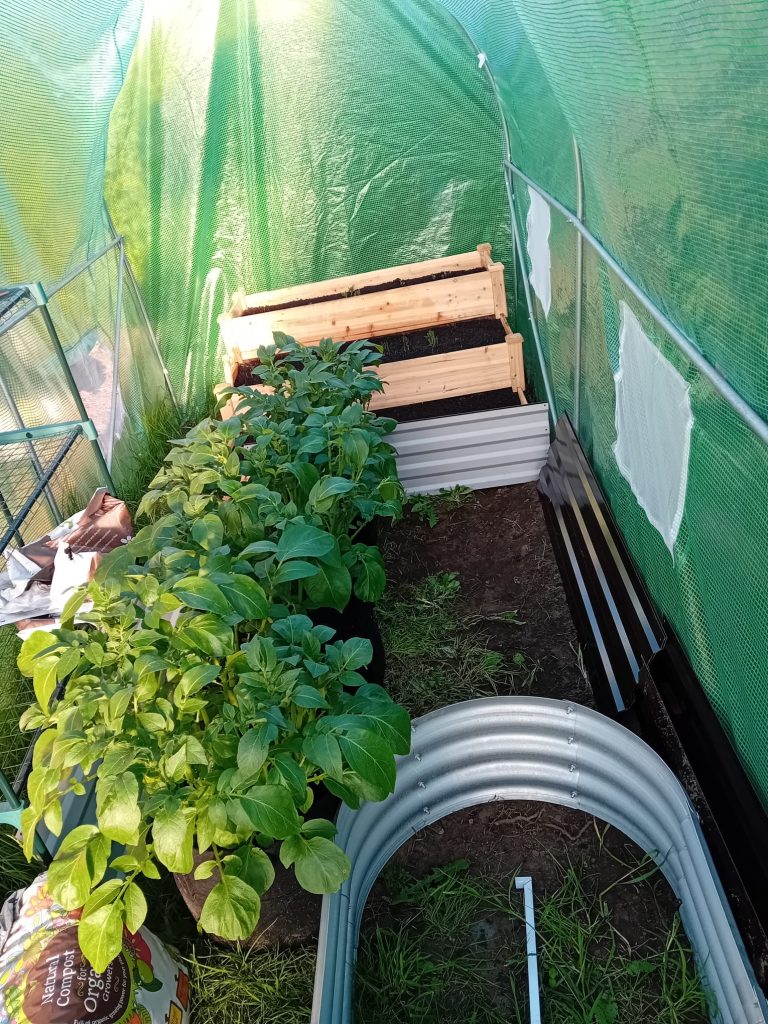

‘I’ve turned my life around. My ‘get up and go’ is now back.’
The new gardening items mean P can now grow his own vegetables and herbs in his back garden. He has grown tomatoes, potatoes, onions, peppers and chillis.
‘Tomatoes are the most difficult. I’m most proud of my tatties because of the way they came out – they were tiny but tasty.’
Gardening also helps P to get out of the house. P needs to look after his vegetables and herbs every day because they need help to grow.
‘I’d rather be in my hut and my garden than in my house. I have to go out because it needs my attention.’
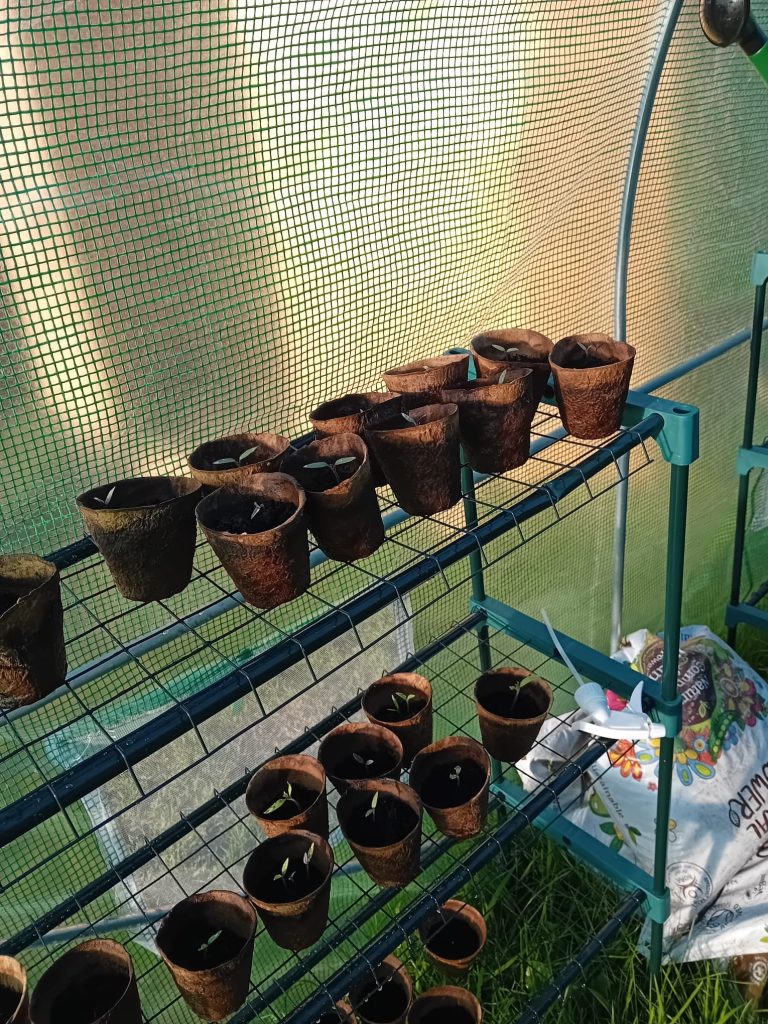
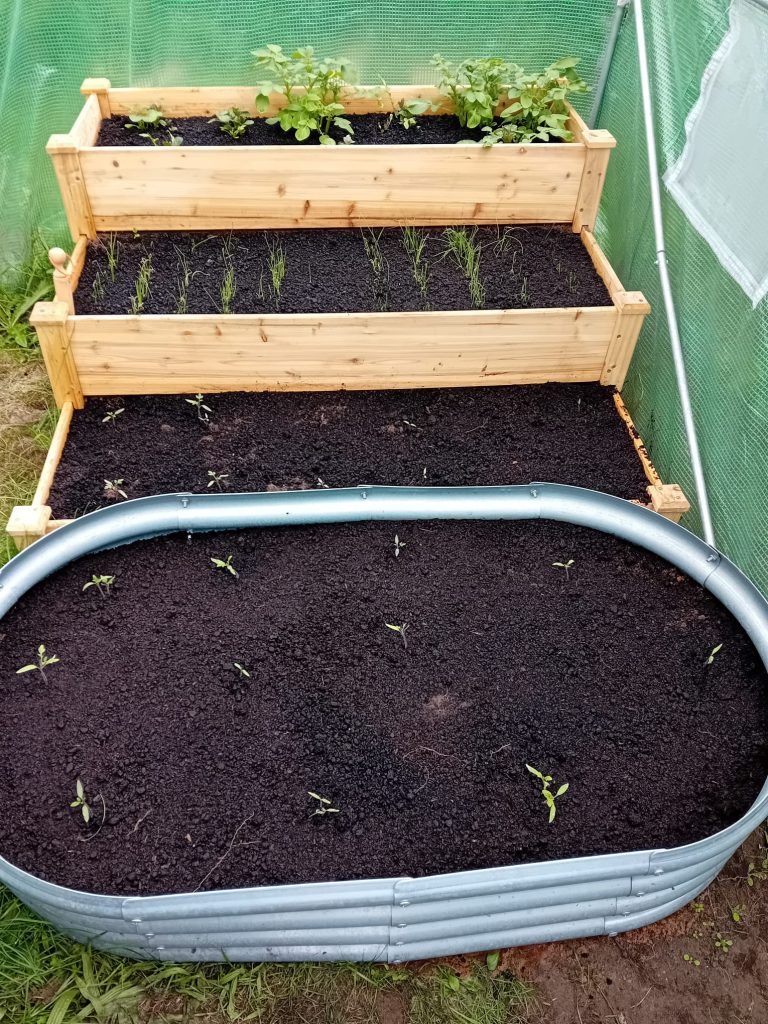
Gardening also helps P to connect with other people. It is something he can talk about with others.
This new hobby has given P a sense of purpose and a feeling of pride. P is hoping to get another polytunnel so he can plant different things. Next he wants to try growing leeks and beetroot.
‘The pride I get is from growing a seed to a plant to giving the vegetables away. I feel I have more purpose. I’ve got a wee glow about me now.’
Top tips
From growing plants at home to taking time outside, being in nature can boost our wellbeing. You can find top tips in our Going Green feature:
www.future-pathways.co.uk/going-green
Here, Trevor shares his thoughts on writing about your own experience.
My thoughts on writing about your own experience
I realise not all who are care experienced would want to write about their own lives which may have been permanently impacted by abuse. The process requires you to revisit painful past memories and look closely at the many ways they still impose themselves onto your life.
Nonetheless, writing and reflection offers an opportunity to gain insight on how you feel and why you feel the way you do in your life now in the present. Writing your story can be a journey toward healing some of your pain and I would advise anyone with care experience to think about writing to gain more clarity.
Future Pathways and The Book Whisperers helped me more than words can explain to record and review my experience. I know from the requests and comments that my story has proven useful to readers. That means my story is worthwhile to me and others.
I would encourage people to get their story out there. It could help you, and it could help another person too.
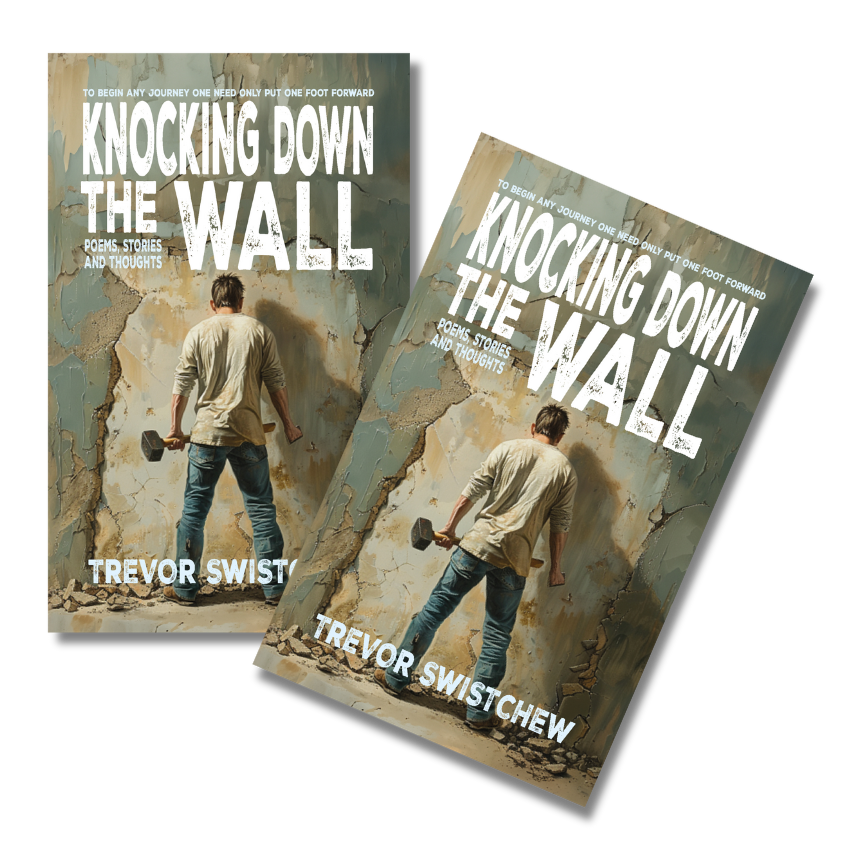
Knocking Down the Wall
Trevor’s latest book is now available. It is called Knocking Down the Wall. It is a collection of stories and poems. In the book, Trevor talks about the challenges of his childhood. But he also talks about his healing journey. He describes confronting and overcoming his past. The book is available on Amazon here.
Discover more
A good night’s sleep can boost your mental health. Here, we share top tips from First Psychology.
Sleep is an important part of our lives. It helps us with our physical and mental health. Good quality sleep can help us feel refreshed. It can help us get ready for the day ahead.
If you find it hard to sleep well, you are not alone. When we sleep badly, we can feel very tired. We can wake up feeling annoyed. And it can be hard to focus on the things we need to do through the day.
Sleeping badly can happen to lots of people. It can happen more when we feel stressed or worried.
What does ‘good sleep’ mean?
Good sleep means:
- You fall asleep within 30 minutes of going to bed.
- You sleep all the way through the night. You do not wake up more than once during the night.
- You get the right amount sleep. Adults should try to sleep for 7 to 9 hours a night.
- You feel refreshed when you wake up.

Tips to improve your sleep
Create a routine.
Go to bed at the same time every night. Try to get up at the same time every morning too.
Try things that can help to relax before bedtime.
Some people find yoga can help them to relax before bed. Some people find it helpful to read or to listen to an audio book. Nice smelling candles and herbal teas can be soothing. A hot water bottle can help you feel more restful.


Get exercise at the right time.
Keeping active during the day helps us get tired for bedtime. Getting outside in the morning can help us sleep better at night. But doing exercise too close to bedtime can make it harder to fall asleep.
Watch what you drink.
Caffeine can affect our sleep. Try not to have coffee or energy drinks late in the day. Alcohol can affect our sleep too. It can make it harder to stay asleep through the night.


Switch off your devices.
The light from phones, tablets and laptops can affect our sleep. Try to switch them off an hour before you go to bed.
Write down your worries.
If you find yourself worrying at bedtime, keep a pen and paper beside your bed. Writing down your worries can help to stop them going round in your head and help you feel more peaceful.
Try not to get frustrated.
If you are finding it hard to sleep, try not to get angry about it. Get up and try a gentle activity, like reading. Then go back to bed when you feel more sleepy.
Find what works for you. Try to be kind to yourself when you are tired.

This article is adapted from a booklet called ‘Sleep better, feel better’. It is written by First Psychology. First Psychology are one of our Delivery Partners. They offer different kinds of therapy, like counselling, psychotherapy and coaching. They are based in Edinburgh but they have offices in lots of places.
You can find out more about them at www.firstpsychology.co.uk
You can see the full booklet at: www.firstpsychology.co.uk/booklets
As the year draws to a close, we want to thank our valued Delivery Partners for working in partnership with Future Pathways in 2024.
Our work together this year
- We worked alongside a network of 51 Delivery Partners offering a wide range of different types of support.
- At least 118 people registered with us – 15% of people accessing Future Pathways – were accessing Delivery Partner support.
- At least 10 people accessed support from more than one Delivery Partner.
- At least 75 people started accessing support from a Delivery Partner.
We also asked our Delivery Partners for feedback through our annual Delivery Partner Feedback Questionnaire. We wanted to know more about what it is like for Delivery Partners to work with Future Pathways, and about the impact of our work together. We received responses from 18 Delivery Partners providing a range of different types of support such as counselling, housing support, and trauma support work. Here are some key findings from the questionnaire.
Our approach


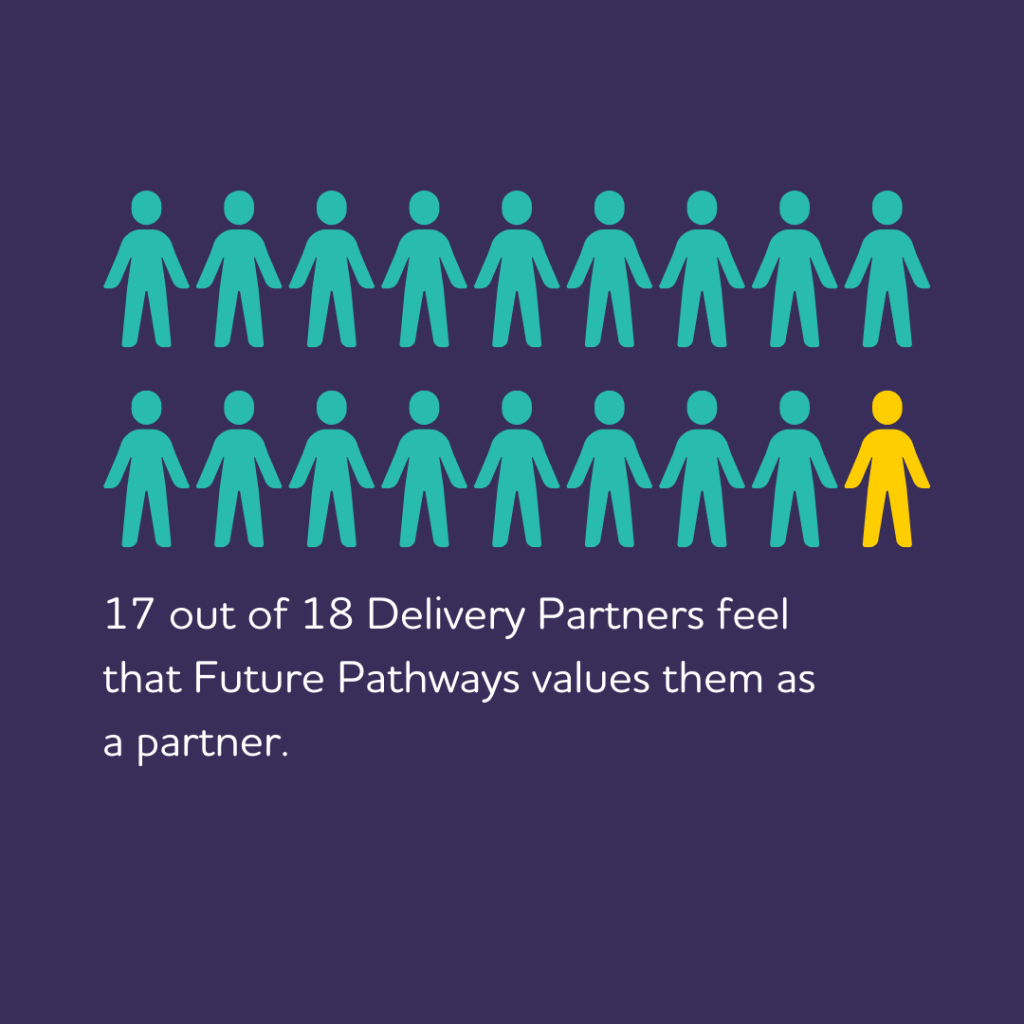
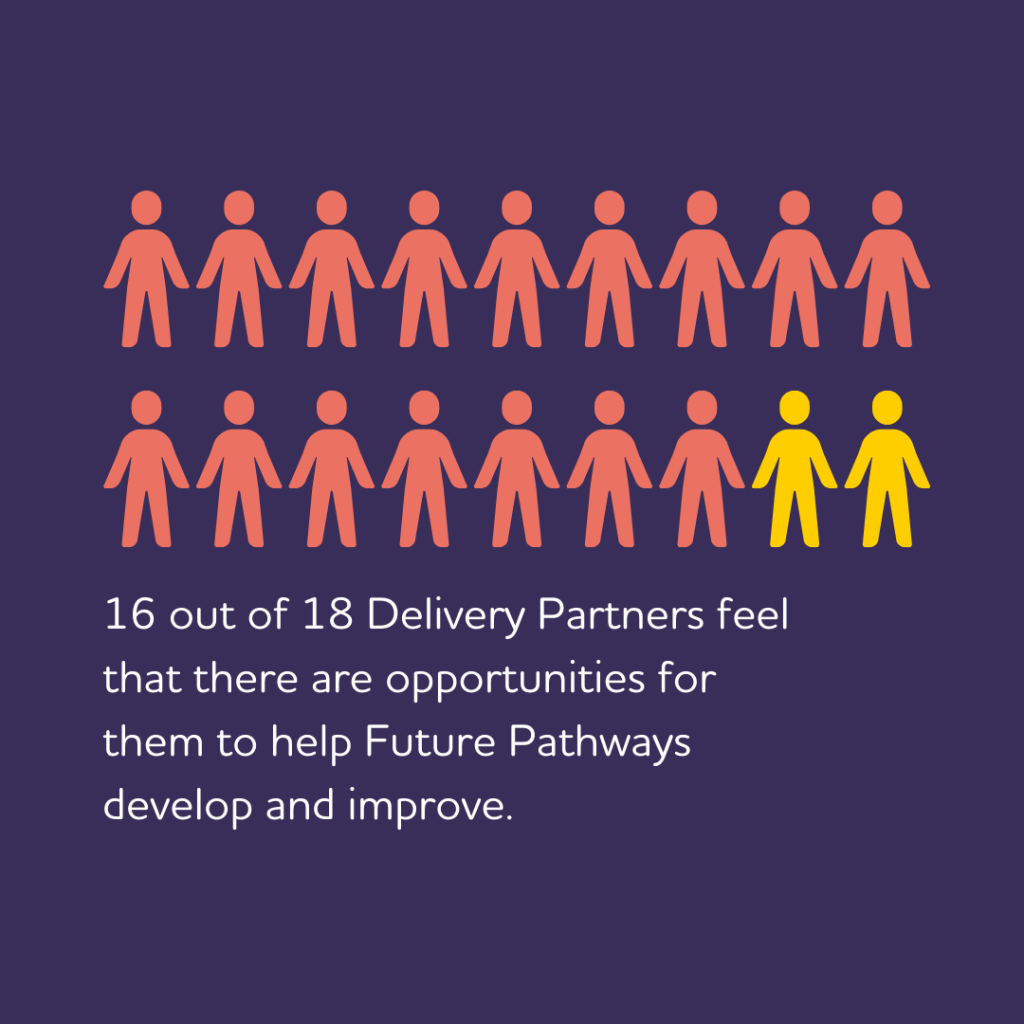
Most respondents told us that working with Future Pathways is different from working with other services because our support is focused on the person; we communicate effectively with our partners; and we are supportive of the work our Delivery Partners do. Delivery Partners used words such as “responsive” “supportive” and “caring” to describe our approach. But the most used word to describe our approach was “collaborative”. This word cloud shows the words our Delivery Partners used to describe our approach.
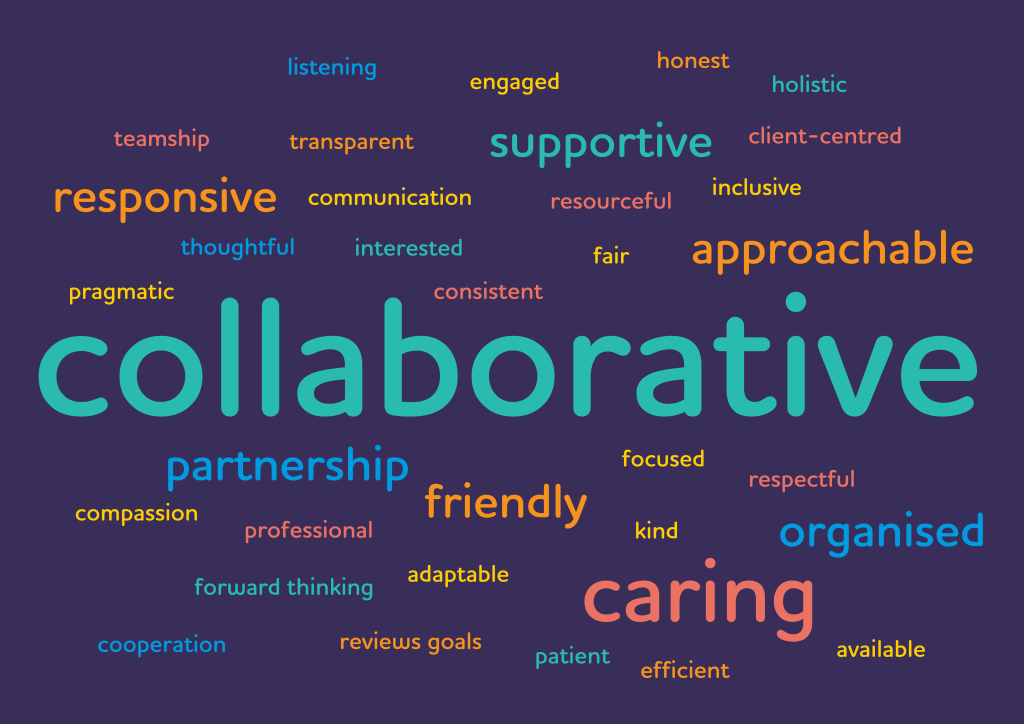
Our impact for Delivery Partners
One of Future Pathways’ outcomes is to make trauma informed support more accessible to people registered with us. And we can see from the feedback we received that this is a big part of the difference we make for our Delivery Partners.
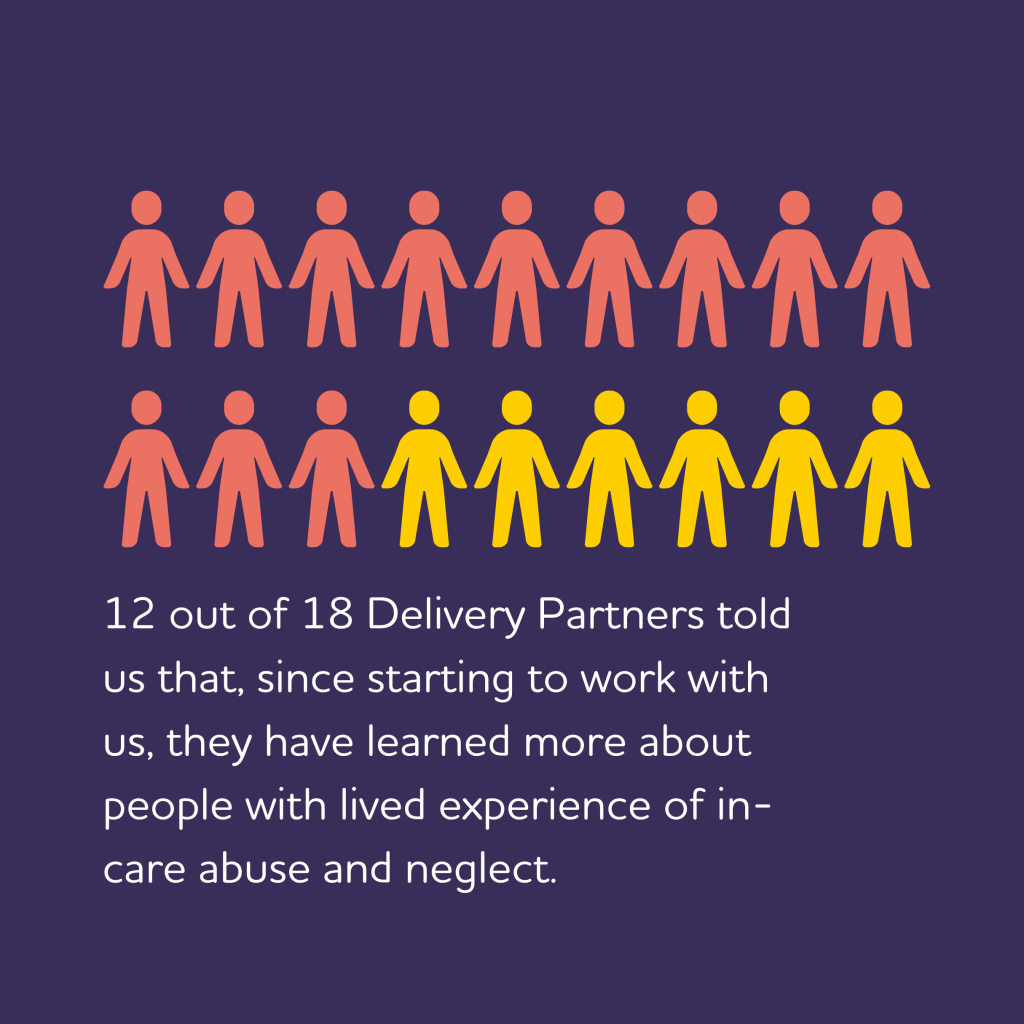
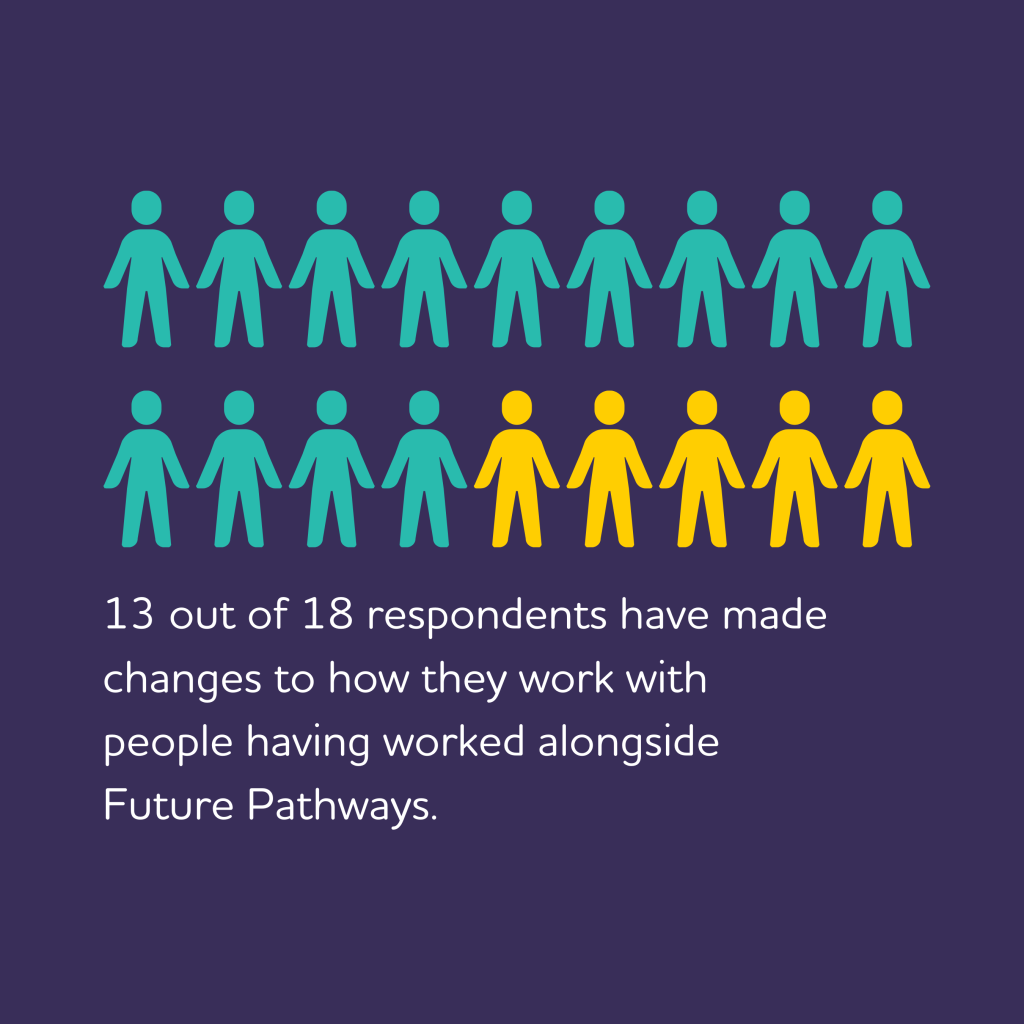
“I have learned that trauma can cause a wide range of physical and emotional symptoms” – Delivery Partner
“I notice that I encourage clients to believe in themselves and to analyse what parts of their lives they feel are challenging” – Delivery Partner
Future improvements
Feedback from our Delivery Partners has also helped us learn how we can improve. While most of the feedback we received was complementary, we also received some suggestions about how we could improve. For example, considering when we review contracts with our Delivery Partners and looking at how we can best measure progress towards people’s goals.
We look forward to continuing to work alongside our Delivery Partners to develop our service, and enhance the support accessed by people with lived experience in 2025.
Find out more about the difference we make
Pathways to Change is our latest impact report. Here, we take an in-depth look at the work of Future Pathways from April 2023 to March 2024. This report helps us to gain a deeper insight into how we make a real difference, and where there is scope for improvement.
Here, we share some tips from Health in Mind about how to help others and
yourself during the winter season.
For many people, winter can be a difficult time. We might feel lonely, stressed or sad. We might see our friends or family finding things hard too. Something we can do that can really help is to give the gift of kindness – to others and to ourselves.
Spotting loneliness
This time of year can be connected to being with friends or family. But when we don’t have people near us, we might feel more alone. If you are feeling lonely, try to reach out to people you trust. They might be feeling lonely too. A phone call, letter or a text might help to make a big difference.

Do things your own way
For some, Christmas, New Year, and other celebrations or traditions that happen over winter, can bring up a lot of difficult feelings, and that is OK. If you do not want to take part in traditions or celebrations, you do not have to. You can let people, including yourself, choose what feels comfortable.

Helping others
Knowing that you are helping others feel good can boost your own wellbeing. It can give you a sense of purpose, community and connection. You could donate or volunteer at your local community hub. You could shop locally to try to help small business. Or you could raise awareness of important causes on social media, like charities you support.

As 2024 draws to a close, we want to take this opportunity to reflect on the support people have accessed at Future Pathways, and the difference this has made to people’s lives.
Our latest impact report published this year showed that our support is vitally important to many people registered with us for many reasons. For example, we know that many people we support experience multiple health and social inequalities, such as living in areas where services can be more difficult to access.
Our work focuses on addressing these inequalities so that people with lived experience of in-care abuse and neglect can live full, healthy and independent lives. While each person’s journey at Future Pathways is unique, this snapshot of our work this year shows that our support has, in different ways, helped many people find their own way to a better life.
This data was drawn from January to November 2024.
People continued to register with and access support at Future Pathways. This year:




People continue to give us feedback that our trauma informed approach is effective.




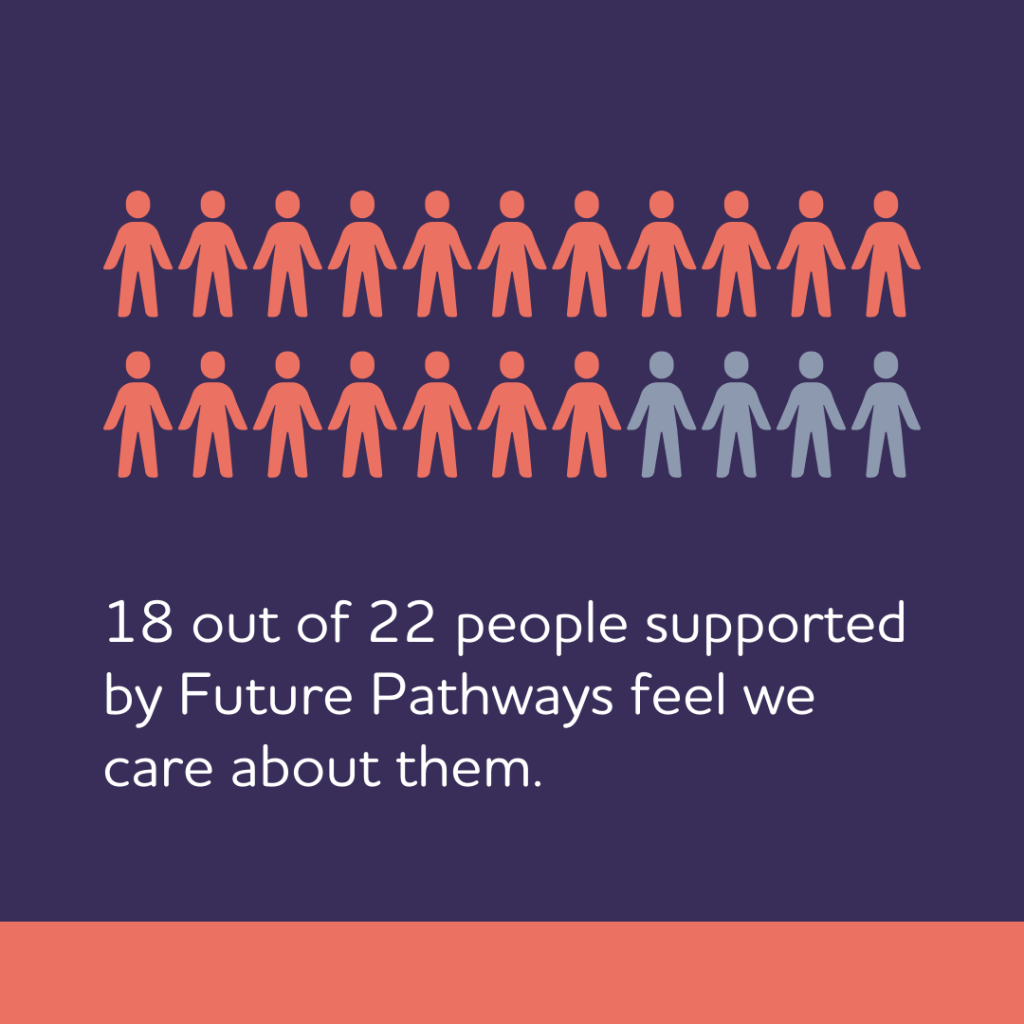
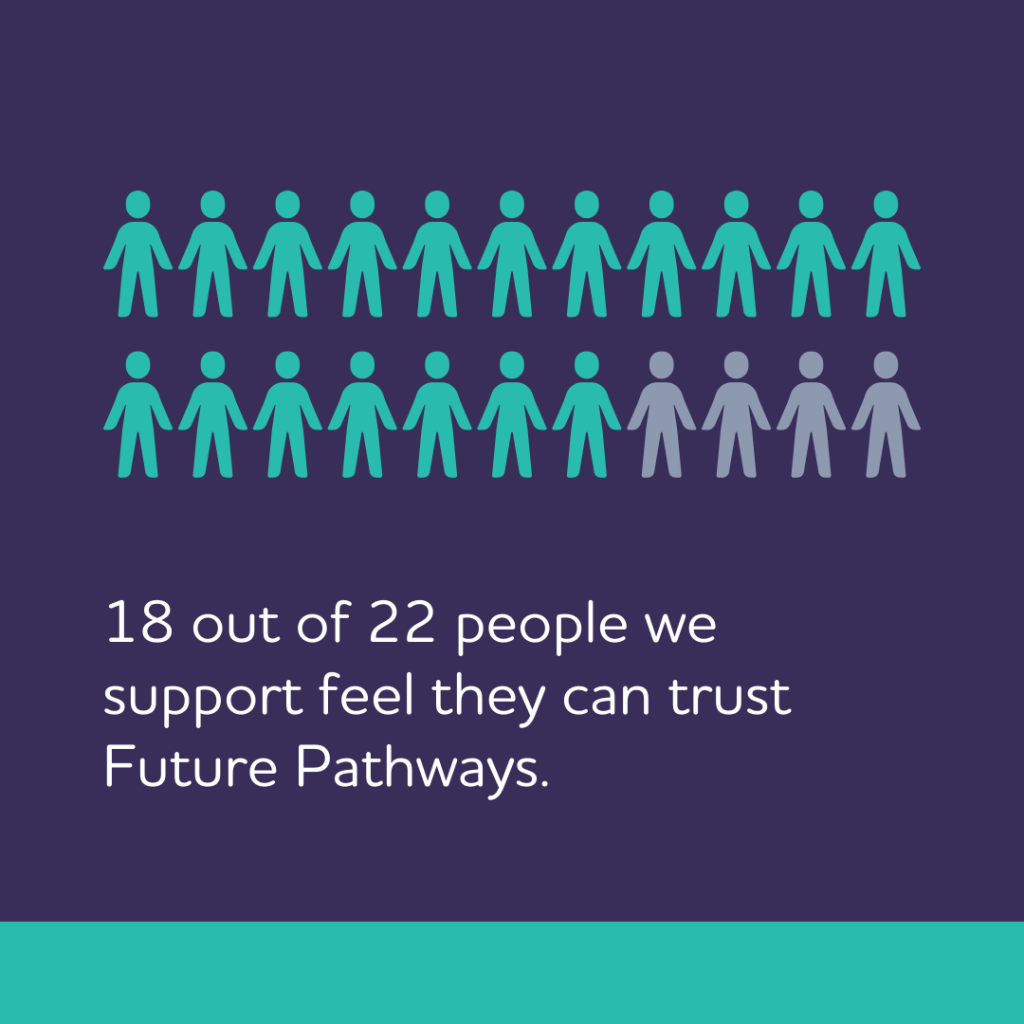
People continued to access a wide range of different types of support through Future Pathways.
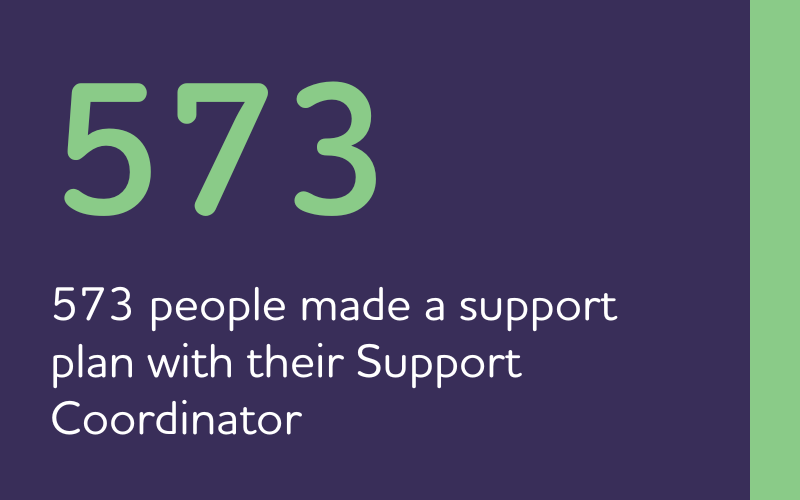
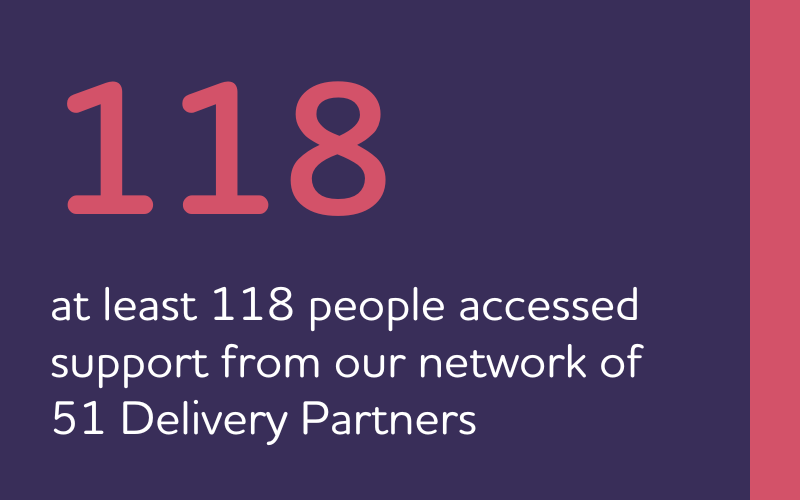
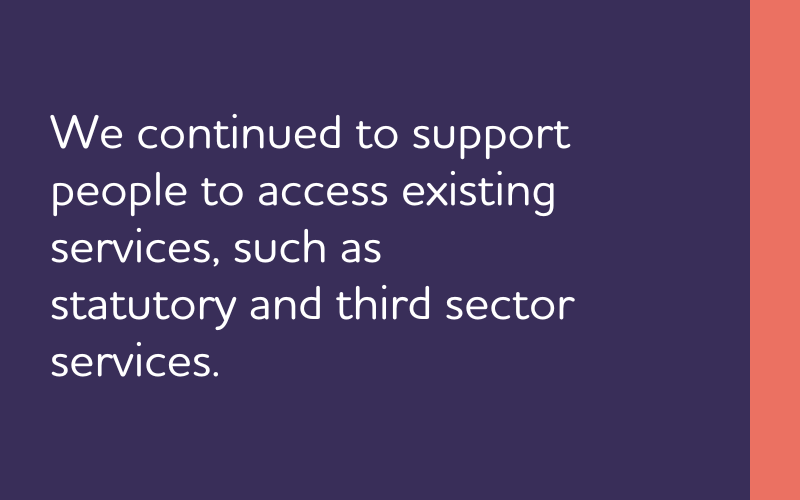
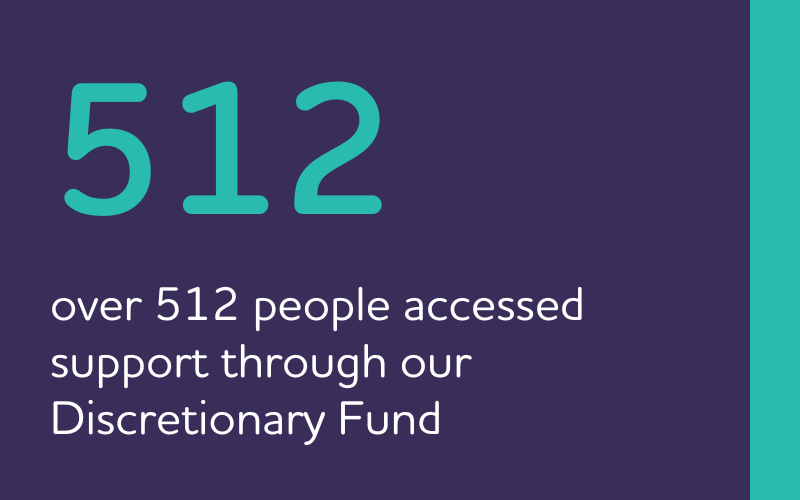
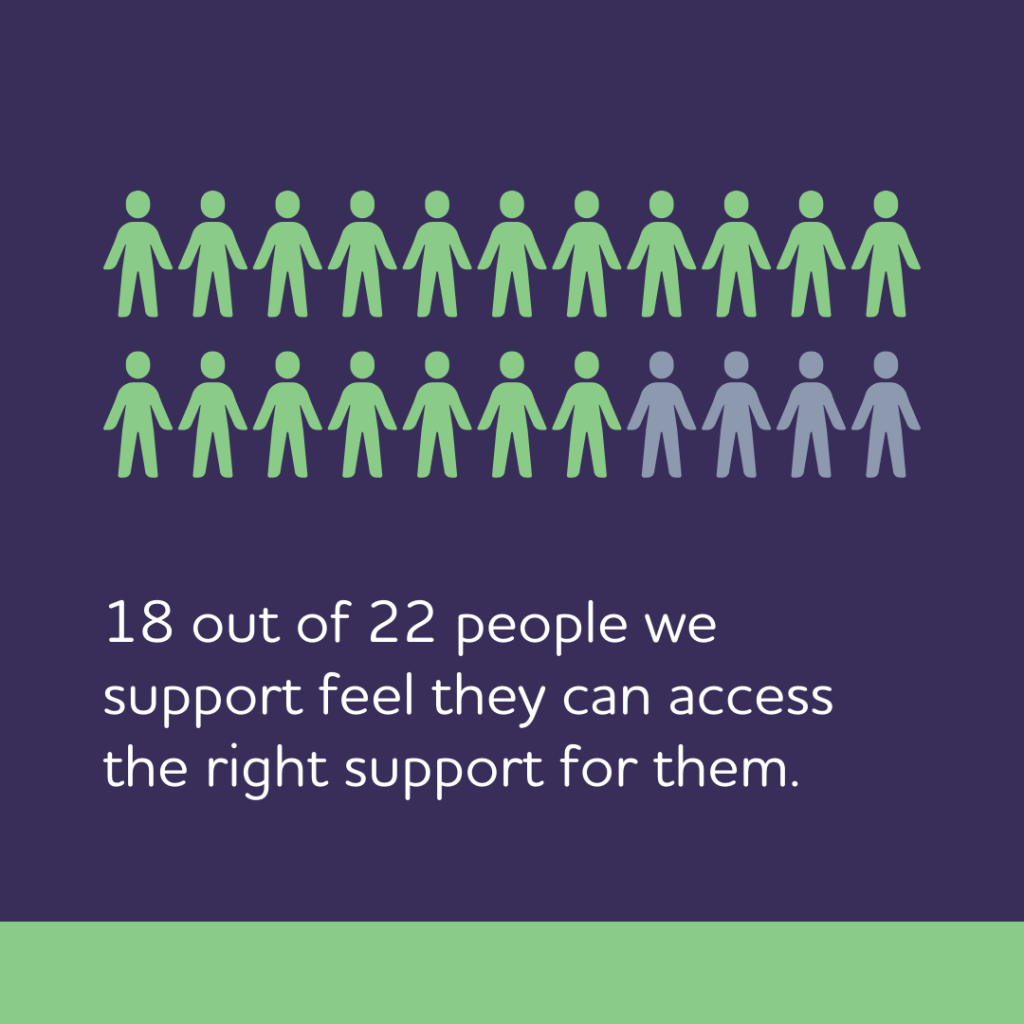
People continue to share that our work contributes to a big difference in their lives.
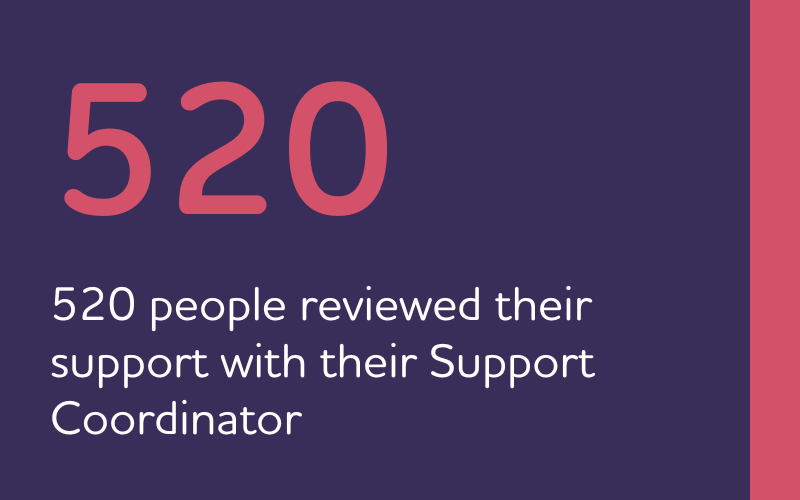
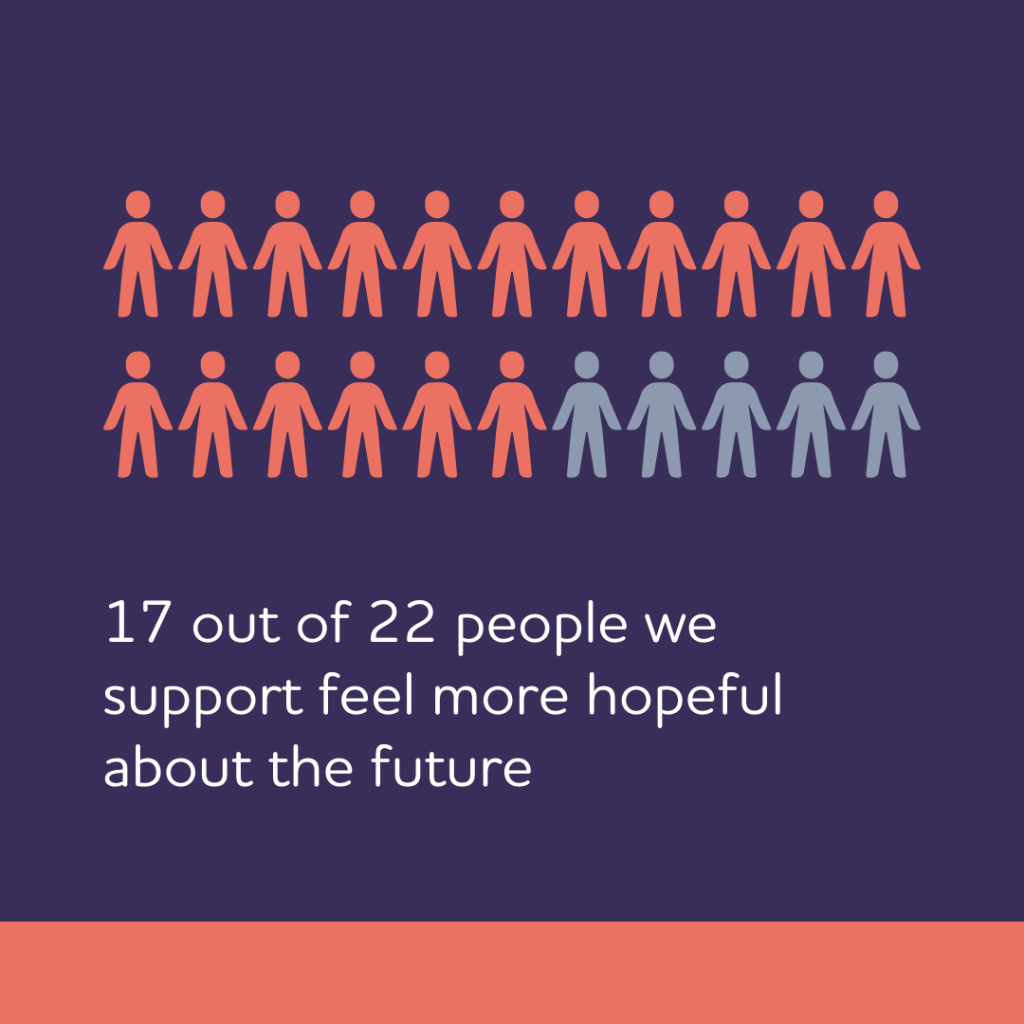
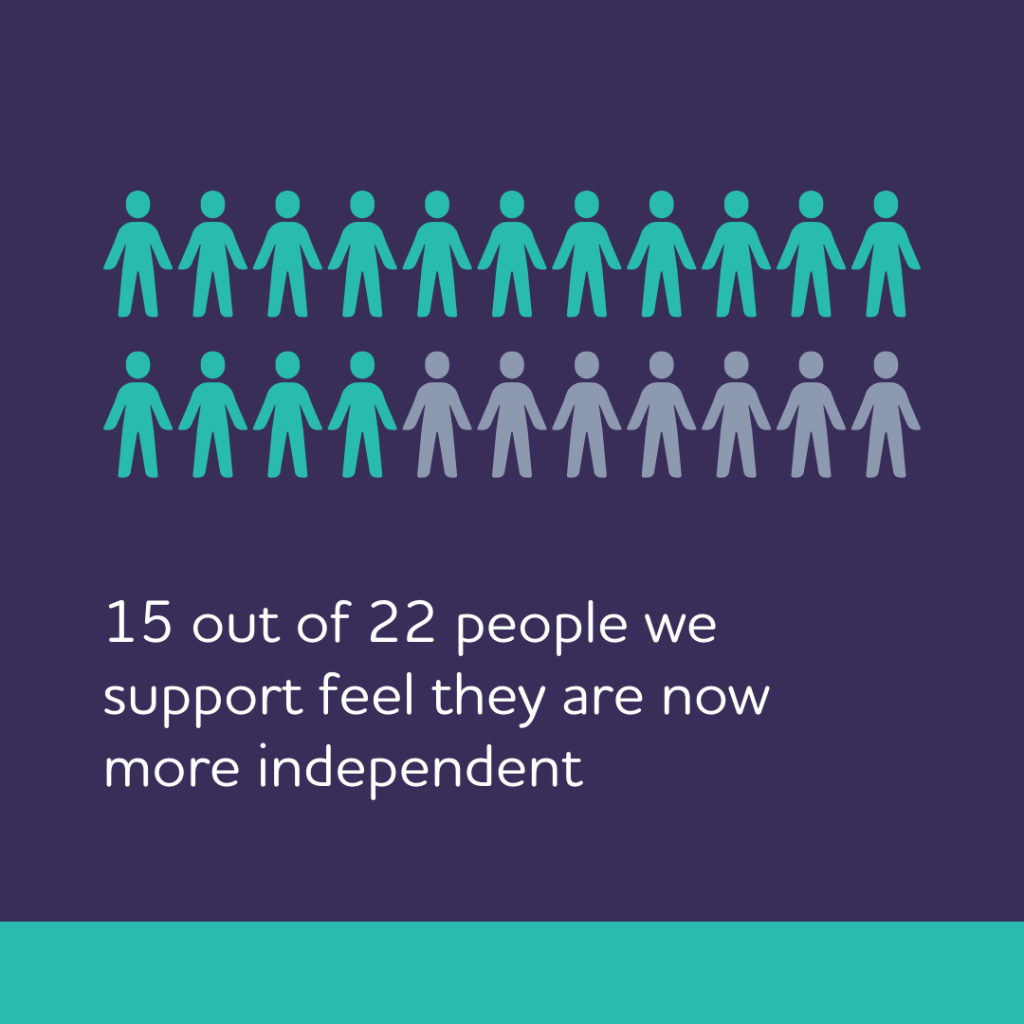
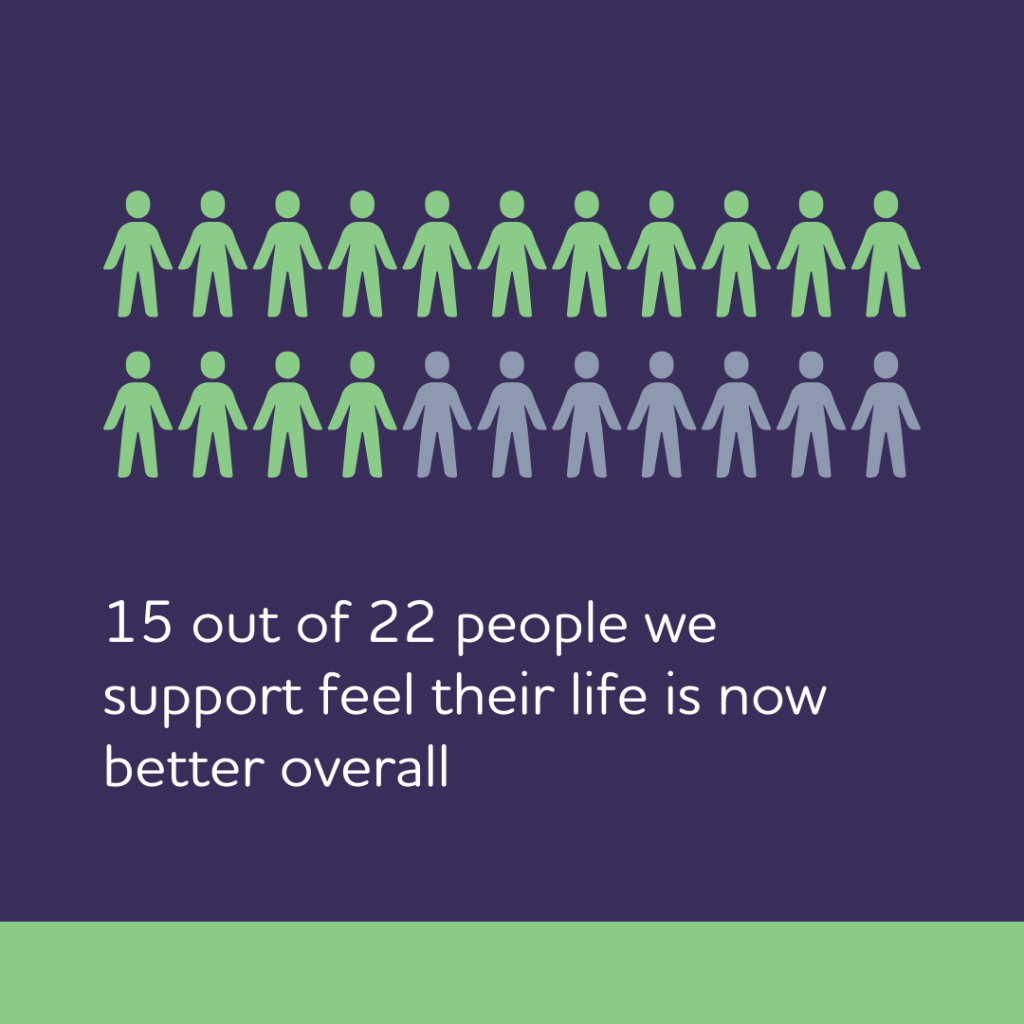
“Future Pathways […] provided all the necessary tools and support for me to make massive changes in my life. Future Pathways supported me in having a voice and I am forever grateful for the support emotionally and practically. This has given me the confidence to speak up for myself and all survivors and to progress forward with a sense of worth and purpose.”
(Person supported by Future Pathways)
The feedback we received has also helped us reflect on how we could improve.
In 2025, we are looking forward to:
- exploring what peer support will look like at Future Pathways
- creating more opportunities for people we support to influence how we develop
- learning more about the impact of our work with existing services, such as statutory and third sector services
Thank you to everyone who has taken the time to share their experience with us this year. Your feedback helps us understand the impact we make and to keep learning and improving.
Find out more about the difference we make.
Pathways to Change is our latest impact report. Here, we take an in-depth look at the work of Future Pathways from April 2023 to March 2024. This report helps us to gain a deeper insight into how we make a real difference, and where there is scope for improvement.
We want to hear from you
You can give feedback about Future Pathways at any time by filling in the form on the website: www.future-pathways.co.uk/feedback
If you would like to get a copy of the feedback form by post instead, you can let us know by:
- emailing engagement@future-pathways.co.uk
- phoning us for free on 0808 164 2005 (open Monday-Friday, 10am to 4pm)
- writing to us at Future Pathways, 40 Shandwick Place, Edinburgh EH2 4RT
- speaking to your Support Coordinator
If you fill in a feedback form, the answers you give will be anonymous. This means that you do not have to provide your name or any personal details.
We are pleased to share our latest report The Meanings of Funded Support. This looks at key aspects around our Discretionary Fund (which offers funded support to people working with us).
We see how accessing funded support can help people achieve their goals, work towards their outcomes and create change in their lives. We also look at the complexities around accessing funded support, such as the ways negative self-perception or complicated interactions with money can create barriers and prevent equity.
The report draws together learning from previous evaluations, such as how we manage funded support in an accountable and equitable way, and how funded support can make a difference. It was also prompted by reflections from within the Future Pathways team around the challenges that can arise when supporting someone to access funding. For example, discussions around funding can, in some instances, detrimentally effect the relationship between the person and their Support Coordinator.
The context within which people access material support at Future Pathways is nuanced. A person’s financial circumstances and relationship with funded support can be affected by their previous experience of trauma. We must, therefore, be aware of such barriers and how we might achieve equity for people we support. This is particularly important in the context of working with people who may have experienced multiple inequalities in their life, and who may have conflicting feelings about accessing funded support.
Given that relationships are at the core of our support, it is vital that we acknowledge the complexity, nuance and dynamics involved in accessing funded support. We see that prioritising transparency, self-awareness and active listening can help mitigate potentially negative experiences of associated with accessing funded support.
This is especially significant given that we know that funded support can make a real impact in people’s lives. It can support a person in achieving their goals and reaching their intended outcomes, such as improving overall wellbeing, self-worth, self-esteem and confidence, and gaining increased independence and freedom.
We hope that our Delivery Partners and other services that work with people accessing funded support or financial payments may also benefit from our learning. By looking in-depth at how people access funded support, and acknowledging the multiple complexities involved in this, we can work towards ensuring that people can access the support they need, tailor our support to ensure greater impact and help people make the changes they wish to see in their lives.
“It was huge. Future Pathways have been able to help with things I never thought they could help with. A lot of other services I have worked with could only listen. Nobody was able to do something. Future Pathways really did make a tangible difference in my life.”
(John, Person supported by Future Pathways)
“The cinema membership encouraged me to leave the flat and venture into town. When the cinema was quiet, I felt safe, like I didn’t need to scan the place. Then, I started going to other places in the city like the Gallery of Modern Art.”
(Anne, Person supported by Future Pathways)
